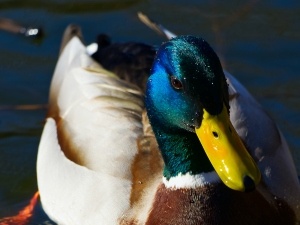
The wild can be a dangerous place for any animal, all animals have predators, humans can be predators to animal predators, and domestic animals can die for a variety of reasons as well.
If you’re wondering why your duck died then this article is for you.
Table of Contents
Why did my duck die?
Ducks can be killed by a variety of ailments, here are possible reasons why your duck died:
Botulism:
Ducks can develop botulism if they directly or indirectly ingest the toxin that the Clostridium botulinum bacterium produces. A bird that contracts botulism can die within the first 24 hours of life.
Birds who contract this ailment have to lie down because they aren’t able to stand. Their neck will become floppy and won’t be able to hold the bird’s head up, the neck will simply let the bird’s head fall. The bird will also be listless and have droopy wings.
Lead poisoning:
Ducks can be quite curious creatures, if your bird ingests lead from its environment, then the bird will develop lead poisoning. The bird may take a couple of weeks to die if it ingests lead.
As little as a few lead pellets can kill a bird, but in some cases, only one lead pellet will be enough to kill the bird.
The birds may find and eat lead from pellets left over by hunters during a hunt or the lead may come from other lead sources in the bird’s environment.
Signs of lead poisoning in ducks include body tremors, weakness, droopy wings, circling, convulsions, a loss of appetite, diarrhea, seizures, lameness, reduced egg production, an unwillingness to fly, a bright green stain at the bird’s vent
Aspergillosis:
If a bird is exposed to mold in its coup, or is exposed to mold elsewhere, then the bird may develop aspergillosis. Mould can grow on damp areas and then waft into the air where ducks can breathe it in.
A bird that is suffering from aspergillosis will show signs of having this condition such as gasping, dehydration, blindness, eye swelling, listlessness, thirst, a lack of appetite, drowsiness, emaciation, and eventually death if not addressed.
Chemical poisoning:
If you’re using pest control methods around your property you may be putting your ducks at risk,
Rodent poisons and insect sprays can kill ducks. If your pest control spray contains an anticoagulant (something that prevents blood clotting) then the bird can bleed to death if they eat the bait
Duck plague:
This is a condition that can affect different types of birds, ducks included, and it can also be fatal to ducks. Duck plague can cause a bird to die 14 days after contracting the disease.
Signs of duck plague in your birds include discharge from the bird’s eyes and nose, diarrhea that is green and watery, anorexia, extreme thirst, ruffled feathers, labored breathing, and eventually the death of the bird.
Avian cholera:
This is a disease that can affect your ducks and cause them to die very quickly after becoming infected, a bird can die in as little as six hours after contracting this ailment.
Avian cholera is caused by the Pasteurella multocida bacterium and symptoms of this ailment in ducks include anorexia, depression, discharge from the bird’s mouth, ruffled feathers, and sudden death.
These birds can literally fall from the sky if infected with this ailment.
Riemerella anatipestifer infection:
This is another sickness, a bacteria infection, that can cause your bird to die if not addressed. This disease is a Pasteurella anatipestifer infection that can affect not only ducks but goslings, turkeys, and other fowl.
Signs of this ailment in your ducks include diarrhea, a discharge coming from the bird’s eyes, coughing sneezing, depression, discharge coming from the bird’s nose, head tremors, weight loss, listlessness, having a twisted neck, a lack of coordination, laying on their back and the shaking of the bird’s neck,
What to do:
If your think that your bird is on its way to dying then you’d need to quickly get the bird to a vet, or an avian vet, if you can.
The vet will be able to physically examine the bird, perform tests on the bird, and diagnose the bird. If the vet can, then they will also treat the bird
If the bird is already dead, then the only way to know why the bird died is to have a necropsy done on the bird to see what was wrong with the animal and keep the rest of the birds in the flock from dying of the same fate.
If you enjoyed this article then you may also be interested in other duck related articles. Here are some articles that you may be interested in: Why Do Ducks Keep Coming To My House, Duck Imprinting On Dog, Duck Imprinting On Humans, How To Tell That A Duck Is Stressed, Do Ducks Know If Their Eggs Are Fertile?, How To Get Ducks To Lay Eggs In Winter

